Exploring the Depths of Psychic Abilities and Insights
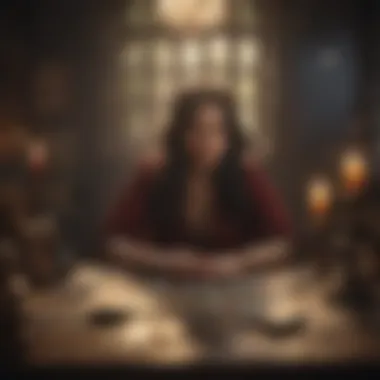

Intro
The exploration of psychic phenomena is as old as civilization itself, steeped in a range of interpretations and beliefs across cultures and epochs. Whether viewed through the lens of folklore or the framework of scientific skepticism, the essence of a psychic remains a perplexing and often misunderstood concept. Individuals who are labeled as psychics often possess a wide array of abilities, from tarot card reading to mediumship.
Understanding psychics requires not just a definition but an examination of the societal and psychological underpinnings that shape our perceptions of them. What does it truly mean to be a psychic? How do different cultures interpret psychic abilities? This article seeks to shed light on these inquiries, not just by listing terms or methods but by drawing a rich tapestry of narratives that define the world of psychics.
Astrological Concepts
Definition of Key Terms
Before we delve deeper, it is vital to define key terms that form the foundation of this discourse. Terms like intuitive, clairvoyant, and medium may often be thrown around interchangeably, yet they denote distinct nuances within the psychic landscape. For instance, an intuitive might simply possess a heightened sense of awareness, whereas a clairvoyant claims to perceive events or information beyond ordinary sight.
Historical Background of Astrology
Astrology, the study of celestial bodies' movements, has influenced psychic interpretations throughout history. Cultures such as the Babylonians took detailed observations of planetary positions, attributing meanings that could correlate with human experiences. Fast forward to today, and Western astrology draws heavily on these historical precedents. The connection here is tightly interwoven—the celestial affects the terrestrial.
Overview of Different Astrology Branches
Astrology isn't a monolith but rather a multitude of branches, each offering unique insights and methods. Here’s a brief exploration:
- Natal Astrology: Focuses on an individual's birth chart, deciphering personality traits and potential life paths.
- Mundane Astrology: Analyzes world events, making predictions based on celestial movements.
- Horary Astrology: Addresses specific questions by interpreting the chart cast at the moment of inquiry.
By understanding these concepts, we can better appreciate how they intersect with psychic phenomena. As we peel back this layer, we draw connections between the celestial and the psychological, ultimately enriching our understanding of what it means to be a psychic in contemporary society.
"The stars incline; they do not bind." This quote summarizes the balance between destiny and free will, resonating deeply within both astrological and psychic contexts.
Zodiac Signs Exploration
In-Depth Analysis of Each Sign
Diving into the Zodiac provides a wealth of knowledge about the characteristics attributed to each astrological sign. For example, Aries, known for its fiery nature, tends to be impulsive and enthusiastic, whereas Pisces, ruled by water, is often seen as empathetic and intuitive. Understanding these traits can deepen our perceptions of psychics; many claim their abilities align closely with their Zodiac characteristics as well.
Personality Traits and Characteristics
Each Zodiac sign houses a set of personality traits that can manifest in unique psychic phenomena. Individuals born under dominant signs like Cancer may find comfort in intuitive arts such as healing or mediumship, while Gemini's intellectual nature might lead them toward analytical psychic methods, like runes or numerology.
Historical and Mythological Connections
Historically, Zodiac signs carry mythological tales that contribute meaning. For instance, the enchanting story of Libra, representing balance, illustrates the quest for equilibrium. The legends surrounding each sign create a rich backdrop for understanding psychic capabilities through cultural lenses.
Celestial Events
Major Cosmic Phenomena
Celestial events—such as eclipses or planetary retrogrades—have long been associated with heightened psychic awareness. These phenomena stir up the collective unconscious, often triggering emotional responses. During significant lunar phases, many psychics report deeper insights and more vivid dreams.
Impact of Celestial Events on Astrology
Astrology posits that the interplay of celestial bodies during these events can influence human behavior. For instance, a solar eclipse might correlate with transformative experiences, aligning perfectly with psychic readings that emphasize change and renewal. In this way, astrology becomes a functional tool for understanding psychic phenomena.
Rituals and Practices During Celestial Events
People often engage in specific rituals to harness energy from celestial happenings. Common practices include:
- Moon Circles: Community gatherings focused on harnessing lunar energy.
- Meditation and Reflection: Deep introspection during significant astrological events.
- Tarot Readings: Seeking guidance aligned with cosmic energies.
These rituals underscore the belief that celestial alignment can enhance psychic abilities, providing a framework for exploring one's inner workings.
In summary, understanding the essence of psychics encompasses a multifaceted exploration of definitions, historical frameworks, and cultural significance. This article aims to open up conversations and deepen our appreciation for the intricate world of psychic phenomena.
Defining Psychic Abilities
Defining the concept of psychic abilities is a critical starting point for understanding the profound intricacies associated with being a psychic. In a world that often seeks rational explanations for every phenomenon, the term "psychic" elicits a range of reactions. Some see this label as an intriguing gateway to understanding our human potential, while others regard it with skepticism, considering it nothing more than myth or wishful thinking.
A clear definition helps to clarify misconceptions and lays the groundwork for further exploration into the historical, personal, and cultural implications of psychic abilities. Recognizing that the term encompasses a broad spectrum of experiences and skills, it invites readers to consider the personal and societal significance of these traits.
Historical Overview
The historical roots of psychic phenomena are deeply intertwined with the evolution of human thought and spirituality. From ancient oracles of Greece to prophetic traditions in various cultures, psychic abilities have been revered and practiced for centuries. Historical texts suggest that shamans were among the first to navigate altered states of consciousness to connect with the spiritual realm. Ancient Egyptians employed crystals and symbolism in their practice, believing these items could enhance intuition and foresight. Such historical frameworks not only give credibility to psychic practices but also showcase a rich tapestry of beliefs formed through generations.
- Key Takeaways:
- Psychic practices date back to ancient civilizations.
- Cultural rituals provided frameworks for engaging with psychic phenomena.
- These historical perspectives shape contemporary understandings.
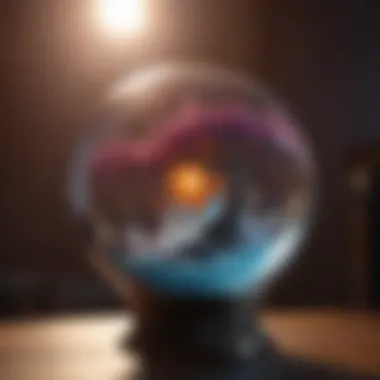
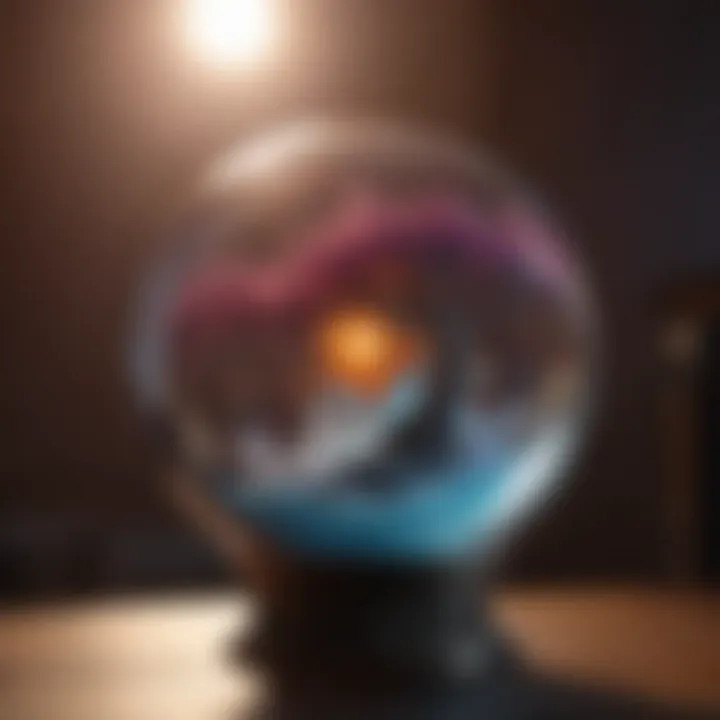
Contemporary Definitions
In today's society, the definition of psychic abilities has evolved and expanded. Modern psychics often identify out of a variety of potentials ranging from clairvoyance—seeing things beyond the physical to mediumship—communicating with the departed. Such classifications are based on the perception of ability rather than a rigid set of criteria. For instance, someone may consider their gut feelings or intuitive nudges as psychic skills rather than mere intuition.
The advancement of technology and communication has made discussions around psychic abilities more accessible, allowing practices to intersect with really spiritual practices and personal explorations. Contemporary definitions often emphasize the importance of personal experience, suggesting that each individual's connection to the psychic realm is unique.
- Important Aspects:
- Definitions are fluid and adapt based on social context.
- Personal experiences play a pivotal role in how abilities are interpreted.
- Increased access to information has democratized knowledge around psychic practices.
Differences Between Psychic and Intuitive
One crucial distinction to highlight is the difference between psychic abilities and intuition. Although sometimes used interchangeably, these terms refer to different experiences.
- Psychic Abilities deal with external insights often perceived as information beyond the ordinary senses, while
- Intuition relates to internal insights driven by personal experiences and instincts.
While both involve a deeper knowing, intuitive feelings are usually perceived as more personalized and immediate, whereas psychic experiences can be broad and sometimes abstract, often pulling from a collective knowledge or energy.
"Understanding the difference between being psychic and intuitive enriches the dialogue about these fascinating abilities and helps clarify personal experiences."
In short, recognizing the boundaries and intersections between psychic and intuitive abilities can deepen our understanding of how they function in our lives, opening doors for richer experiences. This clarity is not just academic; it has practical implications for those seeking guidance or understanding about their own abilities.
The Multifaceted Nature of Psychics
The exploration of psychics can quickly become bewildering given the myriad of roles and services they offer. Understanding the multifaceted nature of psychics provides a deeper insight into how these individuals operate within the spiritual and emotional realms. Their roles are not limited to mere fortune-telling or vague predictions. Rather, they often serve as guides, messengers, and facilitators of deeper understanding in individuals' lives. By appreciating this intricacy, one can better gauge the significance of psychic practices in our lives and societies.
Types of Psychics
Identifying the different types of psychics helps demystify their unique contributions to the holistic tapestry of psychic phenomena. Each type has its distinct methods and specializations, enriching the overall understanding of psychic abilities.
Clairvoyants
Clairvoyants are perhaps the most recognized type of psychic. These individuals claim the ability to gain information about an object, person, location, or event through extrasensory perception. The key characteristic of clairvoyants is their purported ability to see beyond what is physically present. This skill allows them to offer insights that often bring clarity and understanding to troubling situations. The benefit of clairvoyance lies in its direct confrontation of challenges, allowing clients to envision potential outcomes or hidden influences in their lives. However, this unique feature can also have its disadvantages, as some may misinterpret or misapply the visions they receive, leading to confusion or unwarranted fears.
Mediums
Mediums claim to communicate with spirits or entities from beyond the physical world. This connection often serves a therapeutic purpose for those seeking closure with deceased loved ones. The main characteristic of mediums is their ability to channel messages from these spirits, providing a form of solace to mourning individuals. Their contribution to the realm of psychic practices is essential as they facilitate a sense of connection between the living and the departed, helping individuals process grief. However, the unique feature of mediumship raises questions about accuracy and sincerity, with potential pitfalls in misinterpretation or even opportunistic exploitation of vulnerable clients.
Tarot Readers
Tarot readers utilize a deck of cards to provide insights and guidance based on symbolic interpretations. One of the key characteristics of tarot reading is the ability to tap into a narrative through the arrangement of cards. This practice offers a structured way for individuals to reflect on their current circumstances or make future decisions. The benefit of tarot reading lies in its capacity to stimulate self-reflection and introspection, prompting individuals to uncover their inner wisdom. However, one might argue that a disadvantage of tarot reading is the reliance on external symbols, which can sometimes overshadow the reader's intuition.
Psychometric Practitioners
Psychometric practitioners discern information through physical objects. By handling personal items, they attempt to access details about the item's past or its owner's experiences. The defining characteristic of psychometry lies in this tactile interaction allowing for a subtle blending of energy and memory. As such, these practitioners often reap rich insights through touch, making their readings highly personalized. This unique feature can be incredibly advantageous in providing specificity to readings that other psychic practices might lack. Yet, limitations arise, particularly when physical objects are not available, leaving the practitioner without essential tools for their insight.
Common Abilities and Skills
The psychic realm is typically marked by a number of common abilities and skills that different types of psychics may exhibit. These include:
- Clairaudience: The ability to hear messages from the spiritual realm.
- Claircognizance: Knowledge gained without the use of the usual senses, often known as intuitive knowledge.
- Telepathy: The ability to transmit thoughts to others without spoken words.
These skills underscore the complexity of psychic practices, and they link various forms of intuition across different disciplines. By recognizing these abilities, we dive deeper into the layers of what it means to be psychic.
"Psychics are not just about seeing the unseen; they offer a mirror, reflecting possibilities that often lie buried beneath the surface of our everyday consciousness."
Cultural Perspectives on Psychic Phenomena
The topic of cultural perspectives on psychic phenomena is pivotal to comprehending how societies have engaged with spirituality and the unexplained. Across various cultures, psychic abilities have been interwoven into the fabric of societal beliefs, rituals, and practices. Understanding these diverse interpretations not only sheds light on the historical significance of psychics, but also helps in appreciating their role in contemporary life.
Psychics often serve as connectors between different realms, providing insights that resonate with deep personal truths. By analyzing the psychological and cultural implications of these phenomena, we can contextualize their relevance in modern times. This exploration broadens the lens through which we examine human experience in relation to the psychic realm.
Psychics in Ancient Cultures
The role of psychics in ancient cultures is a rich tapestry woven over millennia. In many early civilizations, individuals exhibiting psychic traits were not merely seen as outliers but rather as vital parts of community life. For example, in ancient Egypt, practitioners known as Hekau utilized their supposed magical powers to interpret dreams and influence agricultural success. Their voices held sway over both the mundane and the spiritual, illustrating the reverence afforded to those with psychic insight.
Similarly, in the indigenous traditions of Native American tribes, shamans or medicine people were essential figures, believed to possess the ability to communicate with spirits. These individuals served as healers and counselors, guiding the community through the challenges of existence. They employed rituals and natural elements to facilitate connections with the unseen world.
This historical perspective highlights that psychic phenomena have long been regarded not just with skepticism but also with a profound respect.
Modern Spiritual Practices
In the contemporary landscape, psychic practices have morphed and adapted, yet many underlying principles remain intact. Modern spiritual seekers often integrate ancient modalities into their practices, utilizing tools like tarot cards, crystals, and astrology for deeper self-reflection. Psychics today exist in a myriad of forms—some work independently, while others are part of larger spiritual communities.
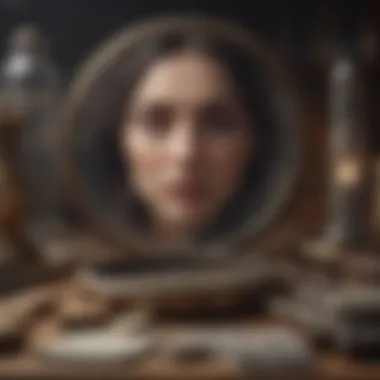
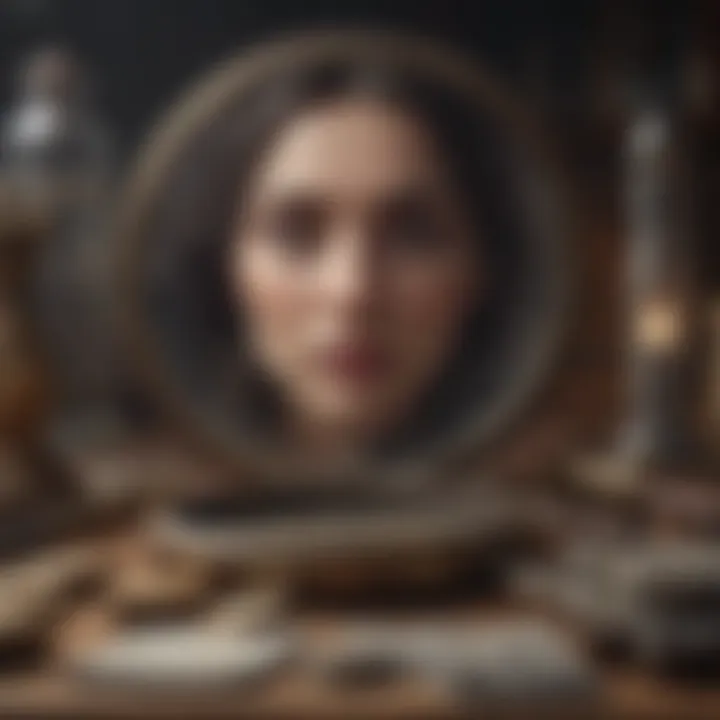
- Tarot Readers: They draw on historical symbolism to provide guidance through the cards. Each card’s placement can yield insights relevant to the questioner’s life.
- Astrologers: Utilizing celestial phenomena, they interpret positions of planets to outline potential life events and characteristics.
- Energy Healers: These practitioners tap into the energy flow around and within individuals, often aiming to heal emotional or physical pain.
In modern spiritual circles, the stigma surrounding psychic phenomena has largely diminished, allowing for a greater appreciation of these practices. However, skepticism from scientific communities still persists, often leading to a dichotomy between belief and disbelief.
Ultimately, whether in ancient or modern contexts, psychics serve as guides, offering understanding, support, and insight into the mysteries of life. Understanding these cultural perspectives enriches the dialogue surrounding psychic phenomena and emphasizes their enduring relevance.
Psychic Reading: Understanding Methods and Practices
Psychic reading plays a pivotal role in the broader understanding of what it means to be psychic. It acts as a gateway, allowing individuals to connect with their inner selves and navigate the tapestry of experiences that life presents. Whether seeking clarity on a matter or exploring one’s own psychic potential, the practices involved in a psychic reading offer insights that transcend mere entertainment. They address personal concerns, foster self-reflection, and provide comfort during uncertain times. In this section, we’ll delve into the diverse methodologies employed during psychic readings, emphasizing their significance and distinct characteristics.
Tools of the Trade
Psychics often rely on specific tools to enhance their intuitive abilities. Each tool carries its own significance and resonates differently with the practitioner and the client alike. Let's examine a few of these tools.
Crystals
Crystals have long been celebrated in various cultures for their inherent energy. They are believed to hold vibrational frequencies that can influence emotional and spiritual states. A psychic practitioner often uses crystals as amplifiers of their energy fields, creating a focused environment for intuitive insights.
Key characteristics of crystals include their ability to cleanse and enhance energy, making them a popular choice among psychics. From clear quartz to amethyst, each crystal is said to possess specific properties that can aid in various forms of readings.
One unique feature of crystals is their versatility in use. Whether placed on an altar, held during meditation, or used in a healing layout, they offer various advantages. However, it’s worth noting that crystals can be subjected to misinterpretation; their benefits often depend heavily on the user's intention and belief.
Tarot Cards
Tarot cards provide a symbolic language that taps into the subconscious. Each card carries deep meanings and can reveal insights about one's past, present, and future. Psychics often employ tarot cards to guide their readings, interpreting the imagery and narratives that unfold during a session.
The key characteristic of tarot is its layered complexity; it doesn't simply follow a linear path but allows for myriad interpretations based on the spread and context. Many psychics value tarot for its ability to provoke thought and offer a narrative framework for personal circumstances.
The unique aspect of tarot is also its accessibility. Anyone can learn to read tarot, but the depth of interpretation often hinges on the reader’s insight. This duality can both benefit and challenge a novice reader: while they might find the cards relatable, they might struggle with the emotional nuances that an experienced tarot reader might capture.
Astrology Charts
Astrology charts serve as a cosmic map, revealing insights based on the positions of celestial bodies at an individual’s birth. Psychics utilize these charts to provide context to people’s behaviors and tendencies. The key characteristic of astrology lies in its comprehensive nature; it encompasses not just personality traits but also life cycles and major transformational periods.
Astrology’s strength is in its methodical approach, combining science and art elucidating complex human experiences based on planetary positions. Its unique feature lies in the vast customization: each chart is uniquely personal, allowing for a tailored interpretation that speaks directly to the individual’s life path.
While astrology provides rich, detailed insights, it also comes with challenges. Misinterpretations can lead to misconceptions, particularly when readers project their biases onto the chart. A responsible psychic must navigate these waters with care.
Process of a Psychic Reading
Engaging in a psychic reading unfolds through a process that typically begins with intention setting. The psychic and the client often start by discussing the purpose of the reading, clarifying what the client hopes to achieve. This phase is crucial, as it sets the tone for the entire session. Following this, the psychic may introduce their chosen method—be it crystals, tarot, or astrology—creating a space that fosters trust and openness. Then, the reading itself commences, where cards are drawn, energies are felt, or charts are interpreted. This part is often fluid, with the psychic responding dynamically to the energies present, weaving in insights and guidance.
Interpreting Psychic Insights
When insights emerge from a psychic reading, interpreting them requires a blend of intuition and analytical thinking. A skilled psychic will parse through the messages, identifying patterns and themes that may arise. This stage becomes a conversation, where the psychic helps facilitate the client's understanding of what these insights imply for their life journey. Moreover, ethical considerations come to the forefront here, as the psychic must present these insights delicately, ensuring that the client feels empowered rather than overwhelmed.
In summary, the methods and practices employed in psychic readings enrich the experiences of both the psychic and their clients. Understanding these elements can enhance one’s appreciation for the discipline and its multifaceted contributions to personal growth and self-exploration.
Psychic Experiences in Everyday Life
Psychic experiences permeate various aspects of life, offering a lens through which individuals can engage with the world around them in extraordinary ways. This section emphasizes the myriad of psychic phenomena occurring daily, illustrating their significance and impact on those who encounter them. From nuanced intuitions that guide decisions to profound encounters that alter one’s perception of reality, these experiences suggest an underlying interconnectedness that merits exploration. Understanding how these intuitions arise and what they signify aids individuals in navigating their own lives more successfully.
Personal Testimonials
Personal testimonials serve as an insightful entry point into the domain of psychic experiences. These narratives unfold the reality of how ordinary individuals cross paths with extraordinary insights. Consider, for instance, a young woman who, in the throes of a challenging relationship, suddenly perceives vivid images of her partner’s past actions and intentions. This revelation empowers her to make informed choices about her future. The vulnerability in sharing such intimate accounts helps demystify the psychic experience, transforming it from a whispered rumor into tangible reality.
The importance of these shared stories cannot be overstated. They foster community and connection among those who have experienced similar occurrences, alleviating feelings of isolation that often accompany psychic insights. The collective sharing encourages others to reflect on their own experiences, allowing what may have seemed inexplicable to come into clearer focus.
Among the testimonials, themes often emerge:
- Moments of Clarity: Many individuals describe sudden moments of clarity that guide them during tough times.
- Coping Mechanisms: Some find solace in psychic experiences, using intuitive knowledge to navigate personal challenges.
- Confirmation of Beliefs: Such accounts often reinforce the notion that unexplainable dimensions exist beyond the visible world.
One might say that these testimonials act as windows into a complex world, revealing how intuition coexists with the routine of day-to-day life.
Ethics in Psychic Readings
As fascinating as the psychic realm can be, it brings along an ethical framework that must be respected and adhered to. Ethical considerations in psychic readings revolve around the responsibility of the psychic practitioner in maintaining the integrity of their work. Practitioners, including tarot readers and mediums, hold a potent influence over their clients’ emotional states, and this role should not be taken lightly.
Decisions made based on psychic readings can have significant implications on personal relationships, career paths, and mental health. Therefore, the ethics surrounding these interactions become crucial. Practitioners must prioritize transparency and consent.
Some of the important ethical guidelines include:
- Informed Consent: Practitioners should ensure clients understand the nature of the session and what to expect.
- Compassionate Communication: Delivering messages with sensitivity is vital to avoid causing distress or misunderstandings.
- Boundaries: It is necessary for practitioners to maintain professional boundaries, ensuring a safe therapeutic environment.
- Avoid Overstepping: While insights can be profound, advising clients on actions should be approached with caution to guard against power imbalances.


Practitioners are often seen as guides rather than decision-makers. They should empower individuals to harness their own intuition while also respecting the autonomy of those they assist. Ethical adherence fosters a nurturing space where the benefits of psychic experiences can manifest positively without overstepping personal boundaries.
"Ethics in psychic readings aren't just about rules; they're about respect and compassion for the shared human experience."
Addressing the nuances of ethics not only enhances the credibility of psychic professions but also supports a more profound understanding of the responsibility that accompanies the gift of insight.
Skepticism and Criticism Around Psychics
Skepticism surrounding psychics is not just an academic exercise; it's a significant aspect of understanding the complex interplay between belief and reality. This article aims to explore the varied dimensions of skepticism, providing insight into the reasons why many people question the validity of psychic phenomena. In dissecting this topic, one can better understand how skepticism can actually foster healthier dialogues about psychic practices, ultimately leading to more informed perspectives.
Debunking Myths
The myths surrounding psychics are as colorful as the individuals who claim to possess these abilities. For instance, a common misconception is that all psychics can predict the future with pinpoint accuracy. In reality, many psychics interpret energies and patterns rather than browse through a crystal ball. They offer insights based on intuition, not infallible prophecies.
Another prevalent myth is that psychics exploit vulnerable individuals solely for profit. While this may hold true for a few, the bulk of psychics genuinely seek to assist those in need, providing guidance and support in times of turmoil.
Here are a few myths worth debunking:
- All psychics are frauds: While fraudulent practices do exist, many psychics operate with integrity.
- Psychics always tell you what you want to hear: Many psychics reveal information that may not be easy to digest.
- Only specific tools reveal truths: Crystal balls, tarot cards, or astrology charts are simply tools, and the prowess lies within the practitioner’s skills.
For readers interested in how these myths affect perceptions of psychics, it may be insightful to compare these perceptions to those held in other spiritual practices. Different cultural contexts can shift how psychic abilities are viewed.
Psychological Aspects of Belief
Understanding the psychological dynamics at play is crucial to discussing skepticism. Human beings are naturally inclined to seek explanations for events and occurrences that seem beyond the norm. The psychology behind belief in psychics often intertwines with personal experiences, cultural backgrounds, and psychological needs.
One theory suggests that belief in psychic phenomena can serve as a coping mechanism, helping individuals navigate uncertainty in their lives. When faced with challenges, having a psychic reading may offer a sense of direction or reassurance. In some cases, people may turn to psychics as a form of existential exploration, seeking to understand their life’s purpose or the reasons behind their struggles.
Additionally, the placebo effect can play a role. If a client believes strongly in psychic abilities, their mindset may facilitate positive change in their psychological state, which can sometimes be perceived as 'real' outcomes.
Understanding these psychological aspects can provide a more nuanced view of why skepticism exists. It reveals that skeptics often approach psychic phenomena with their own biases, influenced by personal experiences and broader societal narratives.
"Skepticism should not be a barrier to understanding; rather, it can serve as a bridge connecting varying points of view."
In summation, while skepticism is vital for assessing validity, it can also obscure the deeper motivations behind belief in psychic phenomena. Balancing skepticism with an openness to explore different experiences allows for a richer, more comprehensive understanding of what it means to navigate through the world of psychic abilities.
The Role of Psychics in Modern Society
The role of psychics continues to evolve, adapting to the demands of contemporary society. This section aims to illuminate the different facets of psychics, highlighting their significance in everyday life. Their impact extends beyond mere entertainment, reaching into areas such as emotional support, decision-making processes, and even community engagement. In this dynamic landscape, psychics hold a unique position, bridging ancient wisdom with modern understanding.
Psychics in Media and Popular Culture
In today’s world, psychics have flooded media channels. From reality TV shows to podcasts, their presence cannot be ignored. Programs like Psychic Kids and Long Island Medium have garnered substantial audiences, opening a dialogue around psychic abilities. This surge is not merely coincidental; it reflects a growing curiosity about the unseen forces that guide human experience.
- Cultural Reflection: These shows often mirror societal concerns and interests, tapping into the collective need for connection and guidance. Audiences find comfort in seeing these talents showcased, revealing a yearning for understanding in a complex world.
- Diverse Perspectives: Different representations of psychics allow viewers to explore various branches of psychism. Whether channeling spirits or reading tarot cards, the variety available promotes a deeper investigation into what these gifts truly involve.
Moreover, social media platforms such as Instagram and TikTok have birthed a new generation of psychics. They engage youth through accessible content, often making psychic practices more approachable. Individuals can learn more about their own spirituality through affordable readings, workshops, and insightful posts. The availability of this information creates a sense of community, fostering a shared journey towards self-discovery.
"The growing visibility of psychics indicates a society in search of meaning and assurance amid chaos."
Counseling and Support Roles
Not only do psychics provide entertainment, but they also offer substantial emotional and psychological support. Many who seek out psychic services are navigating tumultuous periods in their lives, such as bereavement, relationship issues, or career uncertainties. Psychics often take on roles akin to counselors, helping individuals make sense of their troubles by applying their intuitive abilities.
- Emotional Healing: Some psychics claim to connect with departed loved ones, providing closure to those grappling with loss. Such experiences can be cathartic, offering solace and grounding to recipients. This type of support promotes healing on multiple levels, as individuals come to terms with their grief.
- Guidance and Decision-Making: In addition to healing, psychics often assist clients in navigating decisions. Their insights can shed light on paths that may not be visible due to emotional fog. The information they provide often encourages introspection, illuminating choices that resonate with one's inner truth.
- Community Support: Local psychic fairs and workshops allow for face-to-face interactions, fostering community bonds. These gatherings establish spaces for like-minded individuals to share experiences, creating an environment where curiosity blooms.
In modern society, the roles of psychics are multifaceted, encapsulating the essence of guidance, healing, and community. They are not just figures of mystique but have become integral voices in the ongoing quest for understanding one's self and one's place in the universe. With their roots firmly planted in both ancient traditions and current societal needs, psychics continue to play a crucial part in the fabric of contemporary life.
Closure: The Significance of Psychic Phenomena
As we conclude our exploration of psychic phenomena, it's essential to reflect on their significance in both historical and contemporary contexts. The various dimensions of psychic ability not only enrich our understanding of human experience but also challenge us to reconsider what is deemed possible or real. Psychics, through their unique skills, provide insights that often bridge the gap between the seen and unseen, unlocking perspectives that go beyond mere logical reasoning.
Reflecting on Beliefs and Experiences
Beliefs surrounding psychic abilities often stem from a mix of personal experiences and cultural narratives. Every individual has a unique story, some rooted deep in family lore or folklore, while others emerge from spontaneous occurrences that seem inexplicable. These narratives have lasting effects on how we perceive psychics in society. Many people who seek guidance from psychics do so not just for casual curiosity but often during pivotal moments in their lives — decisions about love, career changes, or personal crises. This creates an interesting interplay between belief and experience, as heard in personal testimonials that recount transformative revelations.
Some might say that embracing the element of psychic insight requires a leap of faith. Yet, through the lens of shared human experiences, we see a pattern emerge. When people discuss their encounters with psychics, it often becomes clear that the act of seeking and engaging with such insights provides comfort and sometimes a sense of purpose. This reveals a fundamental truth: engaging with psychic phenomena transcends the act of belief; it opens avenues for personal growth and self-discovery.
Future of Psychic Exploration
As we look towards the future of psychic exploration, it is evident that the landscape is rapidly changing. With advancements in technology and the growing accessibility of information, new generations are more likely to question, explore, and examine these phenomena without the stigma that once accompanied them. This evolving dialogue ushers in exciting possibilities for research and understanding.
- Integration with Mental Health
- Scientific Inquiry
- Cultural Shifts
- Some professionals are beginning to explore how psychic readings might intersect with mental health support. The non-judgmental, empathetic stance of many psychics could complement therapeutic practices, offering a holistic approach to personal problems.
- There is an ongoing interest in scientifically investigating psychic phenomena, from parapsychology to experiments in consciousness. More rigorous studies could potentially validate the lived experiences associated with psychics, leading to a broader acceptance.
- As society increasingly embraces diverse spiritual practices, the acceptance and integration of psychic practitioners into mainstream culture may flourish. This shift not only enhances the visibility of psychics but could also transform societal norms regarding spirituality and personal insight.
In sum, the significance of psychic phenomena is multifaceted, spanning psychological, cultural, and spiritual dimensions. As we continue to probe these realms, one thing remains clear: the exploration of psychic experiences offers profound insights not just into the abilities of a select few, but into the depths of human consciousness itself. This ongoing journey invites us to craft our narratives, honor our experiences, and challenge the conventional limits of understanding.







